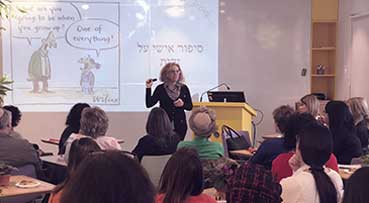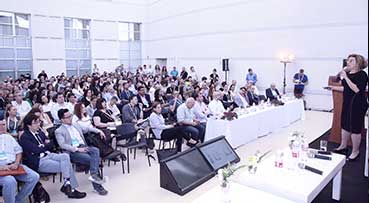The debate we saw this week stresses the importance of understanding that the world of work, the one where we were told what to do and in turn could depend we’ll be taken care of, that world is over. So if you’re looking for a job similar in terms and conditions to the one you’re used to doing, you might discover it no longer exists. The new world is a platform for opportunities that were not there in the past. And it requires us to approach our capabilities, our career, our perspective about work, in a totally new way
The NY Times report on Amazon as a workplace received a lot of attention in the past week. Much of the conversation around the report raised questions about the future, and maybe even the present of workers and the workplace, trying to explore whether the workplace described in the report is unique to Amazon or rather represents the workplace experience for many of us? What are the implications of this competition between human workers and the machines and algorithms which might replace us? Of organizations’ race to the bottom on price and cost? Does all that mean that the world of work we are looking at is one where we are but small cogs in the machine, a machine which can decide at any moment we are no longer a good fit and replace us?
Are you a Cog or a Linchpin?
In his book Linchpin: Are You Indispensable?, Seth Godin examines this very question. The choice of the word linchpin is to contrast it with the cogs in the machine, the same cogs described above. According to Oxford dictionary, a linchpin in a machine is “a pin passed through the end of an axle to keep a wheel in position” and in our context, “a person or thing vital to an enterprise or organization”. That, according to Seth, is what separates the Cog from the Linchpin, and the latter will most probably not find themselves in the position described in the NY Times article.
To understand this point, it is first necessary to understand the changes in the world of work. In the old world the organization was a system designed to make money using of inputs, including us, the workers, to generate output in the form of products or services. The workers in this kind of system, like cogs in the machine, are mostly replaceable. So, according to Seth Godin, we have created a whole ecosystem of education with the only purpose to teach us a profession and put us in jobs. And right behind us there will always be others who learned the same profession and can do the same job, and replace us… If you think about our CVs, or even your profile on LinkedIn, we are taught to use the right keywords, words that will get us mapped to jobs in the organizations. So if the essence of your value is what you can call out with keyword that fit into job definitions, and there are other people with the same value, the same keywords, aren’t you setting yourself up to be replaceable cogs in the organization?
If this sounds harsh, here’s a stronger claim Seth Godin makes. If someone can write out what your job is, if they can give you directions, some form of playbook, or menu, for how to do it, that is a sure sign that the organization can find someone else to do your job. And if they can, they probably will, and cheaper. You can’t charge a premium if the person right behind you can do what you are already doing. And by the way, if that is the case for your job, then at some point a machine or an algorithm will probably replace it anyway…
Are you replaceable?
There are already many examples for this out there. Think about all the call centers which were moved to low cost geographies. These are examples of where the person on the other side of the call is replaceable, as long as they speak our language and follow a script that solves our problem, we don’t really care where they reside. In this form, many jobs were moved out of their original location to wherever they could be found cheaper. Back to Amazon and the claim that workers at the warehouses are measured on the number of boxes they can pack per hour. This is the same Amazon which introduced the yellow robots and is holding the Amazon Picking Challenge in search of a commercially viable automated picking solution. So clearly, in the competition between man and robot for warehouses, once the solution is available the robot will win… And in case this worries you, please ask yourself how you feel about this as a customer, one who expects Amazon to deliver your package within a day or two. Since as customers Amazon is doing exactly what we want it to do, why would we be surprised at the impact this has on the same organization as an employer?
Customers or Citizens of the world?
This dilemma, between what we like as customers and what we like as citizens of the world is also discussed in a fascinating book The Internet Is Not the Answer. Using Amazon as an example, Andrew Keen points out that as customers, we love Amazon for its simplicity of use and efficiency. But we forget the impact Amazon has on the local economies, that the very efficiency we love as customers is causing industries and jobs to disappear. Remember Borders, the bookstore chain? It did not survive the competition and it’s not the only example. According to a study by the the institute for local self reliance, while brick and mortar businesses employ on average 47 people for every 10M$ of sales, Amazon employs only 14. Thus, growth in Amazon sales reduces the number of jobs available. And obviously, dollars spent in Amazon reduce the spending in local businesses. Clearly Amazon is an example of a disruptive force in our new economy, with impact much broader than their employment practices and corporate culture. And clearly these are connected to the very forces of that disruption which we love as consumers. So why are we surprised?
Amazon’s influence on the world of work goes beyond its role as an employer and its impact on local businesses and jobs. Remember that work is moving into the cloud? In his book, Seth Godin reminds us that Amazon created such a work-cloud called the Mechanical Turk, named after a magic trick dating back to the 1700’s. Back then, the machine playing chess had a person inside it. The current day Turk is based on that very concept. Here too, there are people on the other side of your machine (your entry point to the web) and they will do work for you. The pay can be as small as nothing if the work is cut up to small enough segments, an example of what can happen to our work if many others can do it, with pay racing to the bottom.
The debate we saw this week stresses the importance of understanding that the world of work, the one where we were told what to do and in turn could depend we’ll be taken care of, that world is over. So if you’re looking for a job similar in terms and conditions to the one you’re used to doing, you might discover it no longer exists. The new world is a platform for opportunities that were not there in the past. And it requires us to approach our capabilities, our career, our perspective about work, in a totally new way. Back to Amazon for a minute. If we read their Leadership Principles which, by the way, appear on their jobs website, you will probably be able to relate to many of them. These include customer obsession, invent and simplify, take ownership & act on behalf of the company, insist on highest standard, learn and be curious and more. Many of these principles are part of what got Amazon to where it is, to that place where we all know it as customers. Furthermore, a large portion of similar principles are the basis of many excellent work places many of us are part of.
So regardless of where we work, it’s important we ensure we are irreplaceable. Seth Godin argues that will happen if we make sure we do Human work, that which is unpredictable, requires human interaction, creating something new. Art, but not necessarily in terms of painting or sculpting, but art in terms of creativity.
The world of work will rely less and less on those who can do what they are told and more on those who can ask questions, solve problems, create what we didn’t know we needed. And on those who are not afraid. Not afraid to walk into areas never explored, not afraid to fall down and get up and try again, not afraid to be out there alone until the first follower shows up, and then the next one, and then the whole movement. Not be afraid to stand up for what is meaningful.
The question isn’t whether that day will arrive, only when, and will you be ready?

![large-AX1A2125-2[1]](https://niritcohen.com/wp-content/uploads/elementor/thumbs/large-AX1A2125-21-pnzedcs72atx5aeurqytqdiihxixlq02re9mlz805s.jpg)






